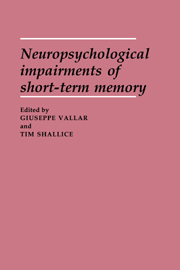Book contents
- Frontmatter
- Contents
- List of contributors
- Acknowledgments
- General introduction
- I THE FUNCTIONAL ARCHITECTURE OF AUDITORY–VERBAL (PHONOLOGICAL) SHORT-TERM MEMORY AND ITS NEURAL CORRELATES
- II PHONOLOGICAL SHORT-TERM MEMORY AND OTHER LEVELS OF INFORMATION PROCESSING: STUDIES IN BRAIN-DAMAGED PATIENTS WITH DEFECTIVE PHONOLOGICAL MEMORY
- III SHORT-TERM MEMORY STUDIES IN DIFFERENT POPULATIONS (CHILDREN, ELDERLY, AMNESICS) AND OF DIFFERENT SHORT-TERM MEMORY SYSTEMS
- 9 Developmental fractionation of working memory
- 10 Adult age differences in working memory
- 11 Lipreading, neuropsychology, and immediate memory
- 12 Memory without rehearsal
- 13 The extended present: evidence from time estimation by amnesics and normals
- IV PHONOLOGICAL SHORT-TERM MEMORY AND SENTENCE COMPREHENSION
- Name index
- Subject index
11 - Lipreading, neuropsychology, and immediate memory
Published online by Cambridge University Press: 11 May 2010
- Frontmatter
- Contents
- List of contributors
- Acknowledgments
- General introduction
- I THE FUNCTIONAL ARCHITECTURE OF AUDITORY–VERBAL (PHONOLOGICAL) SHORT-TERM MEMORY AND ITS NEURAL CORRELATES
- II PHONOLOGICAL SHORT-TERM MEMORY AND OTHER LEVELS OF INFORMATION PROCESSING: STUDIES IN BRAIN-DAMAGED PATIENTS WITH DEFECTIVE PHONOLOGICAL MEMORY
- III SHORT-TERM MEMORY STUDIES IN DIFFERENT POPULATIONS (CHILDREN, ELDERLY, AMNESICS) AND OF DIFFERENT SHORT-TERM MEMORY SYSTEMS
- 9 Developmental fractionation of working memory
- 10 Adult age differences in working memory
- 11 Lipreading, neuropsychology, and immediate memory
- 12 Memory without rehearsal
- 13 The extended present: evidence from time estimation by amnesics and normals
- IV PHONOLOGICAL SHORT-TERM MEMORY AND SENTENCE COMPREHENSION
- Name index
- Subject index
Summary
Introduction
Speech therapists often observe that aphasic patients seem to be very reliant on seeing the speaker. Despite this, and despite the obvious relevance of this observation to remediation, there is little in the neuropsychological literature on aphasia that relates to the ability to lip-read. What sort of help should one expect lipreading to provide for the patient? In particular, is it feasible to ask whether impairments in auditory–verbal processing may dissociate depending on whether the patient can only hear the speaker or can see and hear him? I shall discuss, first, ways of accommodating lipreading to the perception of auditory speech and, second, some aspects of lipreading in immediate memory. These are overlapping areas of concern, rather than separate ones.
There are two opposing standpoints from which to examine the relationship of lipreading to speech processes. One is that lipreading might provide a source of speech information that is somewhat detached from normal speech perception but that can be called on, like a spare electric generator, in an emergency. The other viewpoint, by contrast, takes lipreading to be integrated into auditory speech perception. The analogy here may be to the spare can of petrol that the motorist may carry; it is carried in order to keep the car running when other sources of fuel may be reduced, but it utilizes the same mechanism as fuel that is bought from a gas station.
- Type
- Chapter
- Information
- Neuropsychological Impairments of Short-Term Memory , pp. 268 - 286Publisher: Cambridge University PressPrint publication year: 1990
- 7
- Cited by



